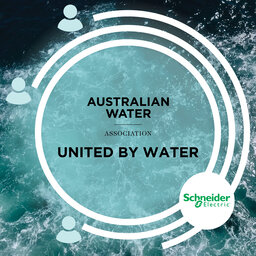Increasing the Capacity of Aerobic Sludge Digester Using MBBR Configurations
What are the pressures on a utility provider with a growing population like Southeast Queensland?
Some of the challenges include population growth, increases in the catchments, changing regulations, specifically around sludge management that have changed recently, they changed that costing landscape for us a fair bit and we've also got movements towards Net Zero, so you see trade waste companies not looking to send stuff to landfill. They're more looking for alternatives on how they can send their high strength waste to digestion processes, so we can try and harness some energy and reduce those volumes for them.
All those factors have put a new lens on sludge management, has that been the catalyst for working with Shihu at the University of Queensland?
Yes, we’re always interested in doing more with less or more with what we've got and that's when we talk to the experts who research better ways to run our equipment, better things to deliver value for the community.
Can you give us a high-level understanding of the work you've been doing around anaerobic digestion?
The current anaerobic digestion is basically putting the sludge into it and then it stays there for 15 days and it comes out stabilised and reaches certain standards and what we’re trying to do is just intensify the process. What we did is putting some plastic carrier in it to grow the bed we want as the biofilm on this carrier and that's why we call it the Moving bed biofilm reactor therefore MBBR and what it does is it keep the useful bed like we want and keeps them in the reactor instead of being washed out of the reactor and then this would allow you to just push more sludge through more quicker.
So Paul, when Shihu who comes to you and says look we can maybe speed this up by five times and you can process five times as much, um is that an exciting opportunity and can you tell us about the pilot that you've embarked on?
The ability to speed things up and get higher rates of treatment is really exciting because what that can do is build smaller tanks and when we're talking about a big facility, these can be millions upon millions of dollars’ worth of tankage or it opens up other opportunities where the rate becomes fast enough and the volumes become small enough that you can utilise a tank you've already got, which is a real win, that's reusing an old piece of infrastructure that is repurposed and brought up to a higher level.
One of the advantages of moving off the lab desktop testing which the University initially does and moving to a Pilot situation like we've now got is we can bring that that system out and run it next to our real anaerobic digestors which is what we're doing now. It’s a great opportunity to keep it on. You get fresh warm sludge that genuinely was in a tank 30 seconds earlier versus when you're at a lab scale or benchtop scale sometimes that's sludge you've collected from site and brought across the lab or even driven to a lab and fed into your digesters intermittently so it's a great next step for working out how it goes
What are the plans for that pilot? is it just at one of your treatment plants or a number?
It's only one at the moment and if we look at it as much as Urban utilities is, we've got a lot of treatment plants, 26 all up however potentially just three treatment plants would use this and two of those plants cater for a population of 1.2 million so despite only two plants allow the pilot, they actually cater for a really large base of our population that we service and there's great efficiencies in that.
Find out more in the episode. Thank you to Shihu Hu and Paul McPhee for their time.
Season 7, United by Water is proudly sponsored by Schneider Electric.
 Australian Water Association Podcast
Australian Water Association Podcast


